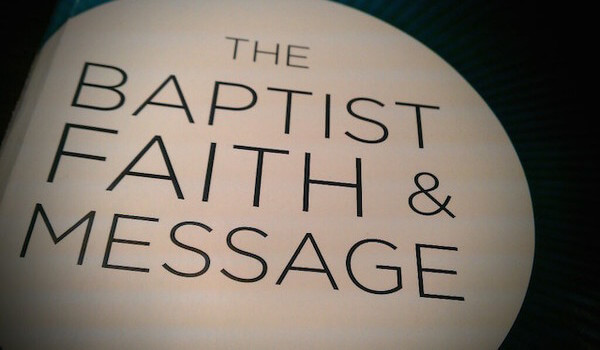Revisiting the Baptist Faith and Message 2000 (II)
***Recently, Southern Baptist Convention president, Dr. Ronnie Floyd, invited me to address a gathering of Southern Baptist leaders on the topic: “The Baptist Faith & Message 2000, A Reflective View Historically and is there anything that Needs to be Addressed in It?” After giving a brief summary of our confessional history, I landed firmly against revising the Baptist Faith & Message 2000. Below is the second installment of a two-part summary of my address. You can access the first part here.
Now that we’ve surveyed the history of the Baptist Faith and Message, I want to answer the question asked of me by President Floyd about whether or not we need to revise the BF&M 2000. Let me state plainly that I would have significant reservations about revising the Baptist Faith and Message 2000. Here’s why. .
1. You do not revise a confessional statement unless you intend to revise it in a substantial way. Thankfully, given the foresight of the BF&M 2000 committee, there is no particular urgency. Our doctrine is clearly and forcefully expressed. There is no one finding a home in our SBC entities through an inadvertent backdoor in our confessional statement, such as existed in the 1963 statement. Put simply—there is no group we need to define out of the SBC.
We should preserve the spirit of 1925, which was restated in 2000, that we maintain a consensus statement. In other words, real change takes real change and you can’t make real change to this statement without excluding a portion of our fellowship.
Moreover, on all the great cultural flashpoints, the statement is sufficiently strong as well. Matters like marriage, sexuality, gender, life, and religious liberty are all clearly expressed in the BF&M 2000. Let’s not fix what isn’t broken.
2. A confessional statement, such as the BF&M 2000, deals with matters of doctrine – not practice. Some have suggested we revise it to speak more forcefully on matters like church discipline. While I have spoken and written extensively on our need to recover regenerate church membership and a robust ecclesiology, I do not think you accomplish this through the BF&M.
3. We are still on-shoring churches, associations, and state conventions to the BF&M 2000. This is a trend to be celebrated, and we need to continue it. Getting as many people as possible on board with the statement already in place should still be priority number one.
4. Given the state of the SBC, I do not think it is time to tinker. We have all lamented our challenges: internal ones like finances, baptisms, evangelism, and lack of unity, as well as external ones, like a belligerent culture. Truth be known, the healthiest aspect of our work these days may be the clarity, biblical strength, and wide acceptance of our confessional statement.
We must always be a denomination in theological conversation, but we ought not always be a denomination in theological conflict. The SBC needs a shot of antibiotics and a steady dose of vitamins, not open-heart surgery.
5. To this point, I have intentionally not referenced the 1998 article on the family, but let me do so now. If we were to encounter a situation, given our cultural moment, where we had to speak more fully to issues of sexuality and gender, then we could propose an article, like the 1998 article on the family.
Though I believe these issues are more than sufficiently covered in the BF&M 2000, if the need were to arise, we should not look to 1963 or 2000, but to 1998. We could surgically draft and adopt an article on human sexuality and gender. If we went down this road, I would argue for a scalpel, not a saw.
However, even under these circumstances, we should be warned. Attorneys have repeatedly warned us, including the seminary I lead, that the longer your policies and confessional statements have been established, the stronger your case in the court of law is. Revising it, in the legal realm, would most likely weaken our case not strengthen it, thus we should only pursue it if it was the better of two bad options.
6. The BF&M 2000 needs renewed attention—but not for revision, but for reassertion and relevance.I fear the challenge of the decades ahead will be having entities more conservative than churches, not less.
Where will our churches and members stand on issues like the exclusivity of the gospel, same-sex marriage, and male leadership in the home and church? Entities more conservative than the churches would be an anomaly in SBC history, and will present their own challenges.
Here is the bottom line: The people make the confession, but the confession should make the people. If we are smart, we will be busy doing just that through teaching it in our churches, requiring it and guarding it in our entities, and applying it in every available way throughout our denomination.
In Conclusion
As Southern Baptists labor to maintain doctrinal faithfulness, sound Baptist identity, and convictional witness, we must also strive for healthier churches, an increasingly robust and global gospel witness, and a unified, well-funded and vibrant denomination.
topicsBF&M, Southern Baptist

Comments are closed.